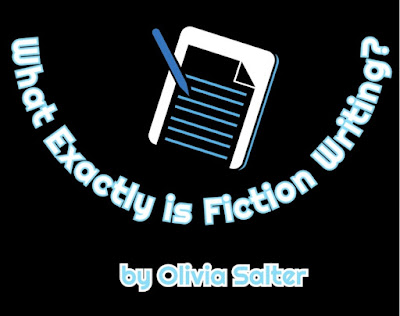What Exactly is Fiction Writing?
by Olivia Salter
Fiction
writing is a captivating and imaginative form of artistic expression
that allows writers to create worlds, characters, and narratives that
transcend reality. It is the art of crafting non-factual prose texts
that transport readers to new realms, provoke emotions, and prompt
reflection.
One of the primary purposes of fiction writing is to
entertain. Fictional stories have the power to captivate readers and
take them on thrilling adventures, allowing them to escape from the
humdrum of everyday life. Whether it's a gripping mystery, a fantastical
journey through uncharted lands, or a heartwarming tale of love and
friendship, fiction has the ability to engage readers emotionally and
intellectually.
Furthermore, fiction writing allows authors to
convey their unique perspectives and explore various themes and ideas.
Through their stories, writers can delve into complex issues, challenge
societal norms, and offer profound insights into the human condition.
Fiction becomes a compelling vehicle for commentary and critique, giving
readers an opportunity to contemplate different perspectives and
broaden their understanding of the world.
There are various forms
and styles of fictional writing, each with its own characteristics,
structures, and techniques. A short story, for example, typically
focuses on a single event or moment in time, often leaving readers with a
powerful impression or revelation. Novels, on the other hand, allow for
more extensive development of characters and plotlines, giving authors
the chance to explore intricate relationships and take readers on
extensive journeys.
Novellas strike a balance between short
stories and novels, providing a compact yet comprehensive narrative
experience. Screenplays, designed for film or television, require a
unique approach, emphasizing visual storytelling and dialogue. Drama,
whether in the form of stage plays or scripts for performances, relies
on powerful dialogue and dramatic tension to engage audiences.
Regardless
of the specific format, fiction writing requires a host of skills, such
as creative thinking, imagination, storytelling prowess, and attention
to detail. Authors must master the art of character development,
creating relatable and authentic individuals who will resonate with
readers. Moreover, they must craft compelling plots that have the right
balance of conflict, tension, resolution, and emotional impact.
In
addition to storytelling elements, fiction writing often incorporates
literary techniques such as symbolism, metaphor, foreshadowing, and
irony. These tools help authors convey deeper meanings and enhance the
overall richness of their narratives. By weaving these literary devices
seamlessly into their prose, writers create a multi-layered reading
experience that invites interpretation and analysis.
In today's
digital age, fiction writing has also expanded beyond traditional
printed mediums. With the rise of e-books and online publishing
platforms, aspiring authors have more opportunities than ever to share
their work with a global audience. Additionally, interactive
storytelling, such as Choose Your Own Adventure books or
narrative-driven video games, presents new avenues for engaging readers
or players in immersive fictional worlds.
In conclusion, fiction
writing is a powerful medium that allows authors to entertain, inform,
and inspire readers through the composition of non-factual prose texts.
By crafting imaginative stories and characters, authors create
narratives that transport readers to new realities and provoke thought.
With its diverse forms and styles, fiction writing has the capacity to
entertain, educate, and connect people through the universal language of
storytelling. Whether it's a short story, novel, novella, screenplay,
or drama, fiction writing continues to captivate hearts and minds with
its limitless possibilities.



No comments:
Post a Comment